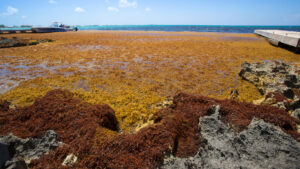A roundup of news items related to climate change and other environmental issues in Florida:
Can Florida survive climate change? Here’s what the Aspen Ideas: Climate conference had to say | Sun Sentinel
Some of the most pivotal climate-change questions — and potential solutions — focus on Florida.
The Sunshine State, with its low elevation and 825 miles of shoreline, make it one of the planet’s most vulnerable locations for both sea-level rise and intensified weather events.
So the state took center stage during the second annual Aspen Ideas: Climate conference, where science and design leaders called attention to some of the latest advancements: Wind and wave simulators that help make crucial findings about storms. Weird concrete hexagonal tubes that might actually save South Florida cities from storm surge. A new solar housing development that withstands hurricanes — without losing power or internet.
Coming soon to Florida beaches: Massive, messy and maybe record mounds of seaweed | Miami Herald
A giant blob of seaweed, spanning 5,000 miles and weighing an estimated 6.1 million tons, threatens to blanket Florida beaches and Caribbean islands with smelly piles of decaying brown goop.

Sargassum — the scientific name for the brown seaweed often found strewn across South Florida beaches — could start piling up in the Florida Keys in the next few days. Scientists expect Miami Beach to become a hot spot later in the sargassum season, which runs from March through October.
This year’s sargassum bloom is shaping up to be one of the biggest ever recorded. Since 2011, a combination of human activity and climate change has created a string of unusually large seaweed blobs. Every year for the past five years has set a new record for the biggest blob ever.
Burning eyes, dead fish; red tide flares up on Florida coast | Associated Press
SARASOTA, Fla. — Residents are complaining about burning eyes and breathing problems. Dead fish have washed up on beaches. A beachside festival has been canceled, even though it wasn’t scheduled for another month.
Florida’s southwest coast experienced a flare-up of the toxic red tide algae this week, setting off concerns that it could continue to stick around for a while. The current bloom started in October.
The annual BeachFest in Indian Rocks Beach, Florida, sponsored by a homeowners’ association, was canceled after it determined, with help from the city and the Pinellas County Health Department, that red tide likely would continue through the middle of next month when the festival was scheduled.
If you have any news items of note that you think we should include in our next roundup, please email The Invading Sea Editor Nathan Crabbe at ncrabbe@fau.edu.



